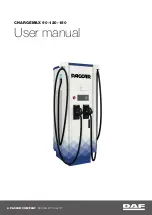
You could lose control of the vehicle in the
following situations:
R
when braking
R
in the event of abrupt steering manoeu‐
vres and/or when the vehicle's speed is
not adapted to the road conditions
#
In the event of a short circuit or a simi‐
lar incident, contact a qualified special‐
ist workshop immediately.
#
Do not continue driving.
#
Always have work on the battery carried
out at a qualified specialist workshop.
R
Further information on ABS (
/
page 152)
R
Further information on ESP
®
(
/
page 153)
Mercedes-Benz recommends that you have the
12 V battery replaced at a qualified specialist
workshop, e.g. at a Mercedes-Benz Service
Centre.
Should you want to replace the battery yourself,
observe the following information:
R
Always replace a faulty battery with a battery
which fulfils the vehicle's specific require‐
ments.
R
Use detachable parts such as the vent hose,
elbow fitting or terminal cover from the bat‐
tery to be replaced.
R
Make sure that the vent hose is always con‐
nected to its original opening on the battery
side.
Fit the existing or newly supplied stop plugs.
Otherwise, gases or battery acid could
escape.
R
Make sure that the detachable parts are con‐
nected in the same way as before.
For safety reasons, Mercedes-Benz recommends
that you only use batteries that have been tested
and approved for your vehicle by Mercedes-Benz.
These batteries provide increased impact protec‐
tion to prevent vehicle occupants from suffering
acid burns should the battery be damaged in an
accident.
&
WARNING Risk of explosion due to elec‐
trostatic charge
Electrostatic charge can cause sparks which
may ignite the highly flammable gas mixture
in the battery.
#
To discharge any electrostatic charge
that may have built up, touch the metal
vehicle body before handling the bat‐
tery.
The highly flammable gas mixture is created while
the battery is charging and when jump-starting.
&
WARNING Danger of chemical burns
from the battery acid
Battery acid is caustic.
#
Avoid contact with the skin, eyes or
clothing.
#
Do not lean over the battery.
#
Do not inhale battery gases.
#
Keep children away from the battery.
#
Immediately rinse battery acid off thor‐
oughly with plenty of clean water and
seek medical attention immediately.
+
ENVIRONMENTAL NOTE Environmental
damage due to improper disposal of bat‐
teries
Batteries contain pollutants. It is
illegal to dispose of them with the household
rubbish.
#
Dispose of batteries in an
environmentally responsible manner.
Take discharged batteries to a qualified
specialist workshop or to a collection
point for used batteries.
If the 12 V battery has to be connected, contact a
qualified specialist workshop.
Observe the safety notes and protective meas‐
ures when handling batteries.
Risk of explosion
Fire, naked flames and smoking are
prohibited when handling the battery.
Avoid creating sparks.
296 Breakdown assistance
















































